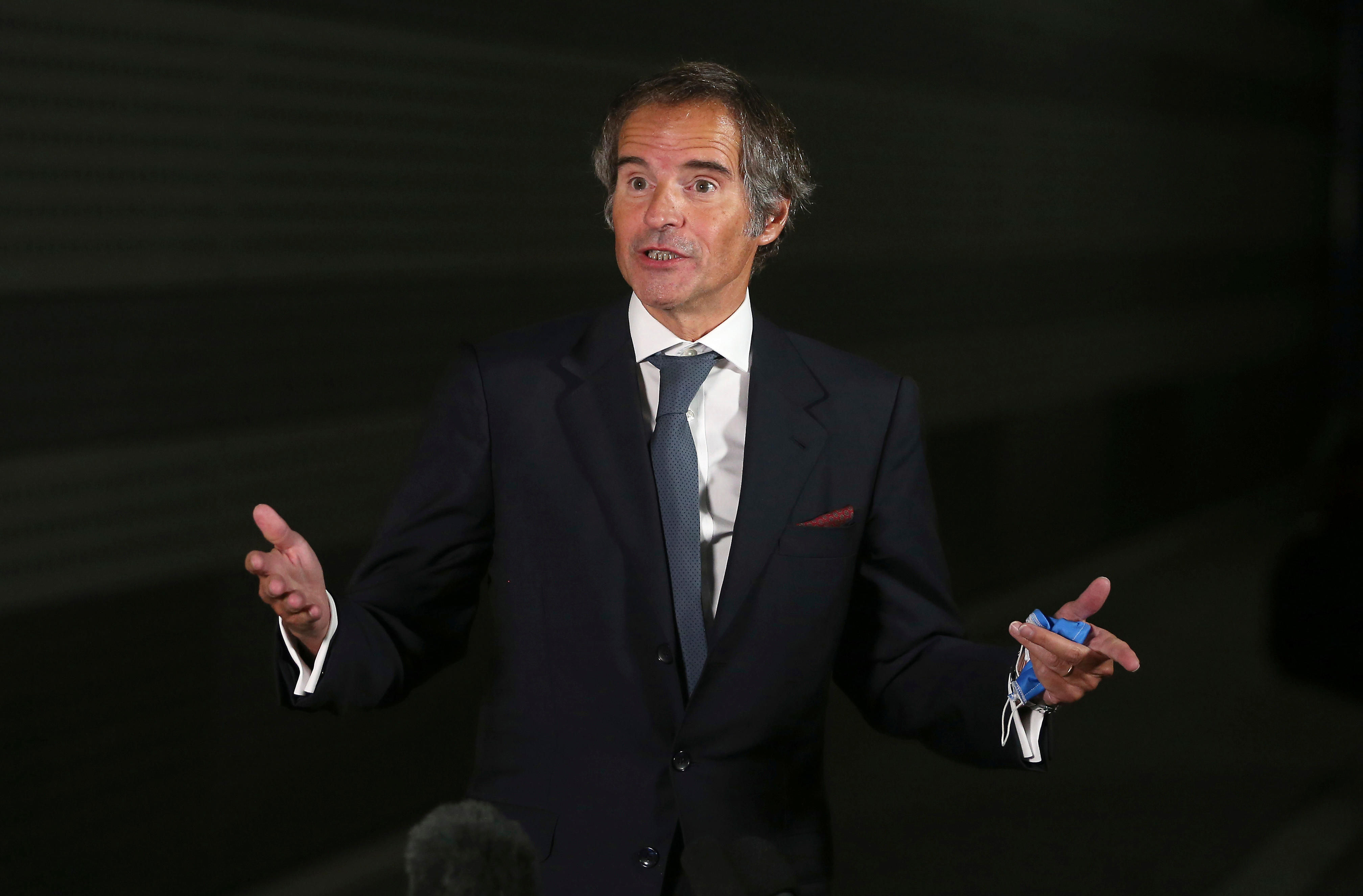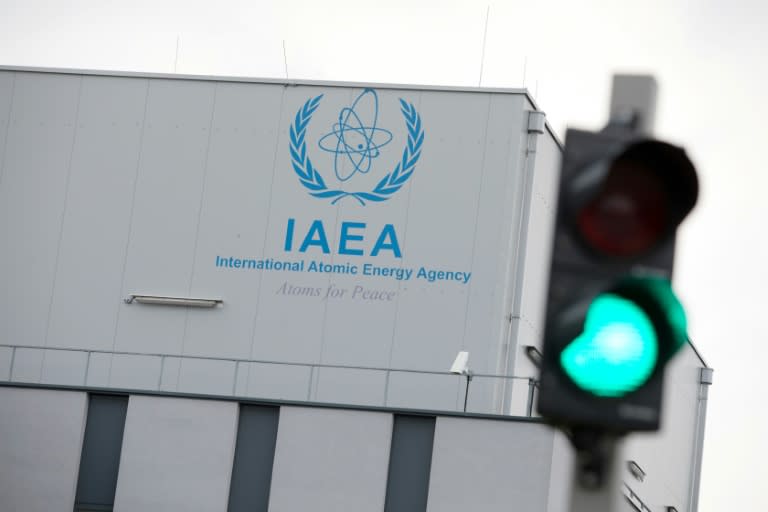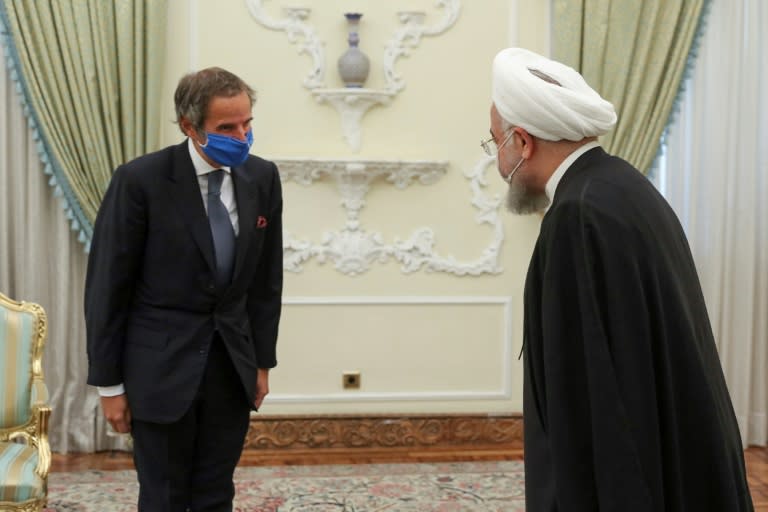Iran nuclear deal members resolved to preserve agreement
DAVID RISING,Associated Press•September 1, 2020

In this Wednesday, Aug. 26, 2020 file photo, Director General of International Atomic Energy Agency, IAEA, Rafael Mariano Grossi from Argentina, speaks to the media after returning from Iran at the Vienna International Airport. Representatives of Iran and the world powers working to save the nuclear deal with Tehran agreed Tuesday, Sept. 1, 2020, in Vienna to do everything possible to preserve the landmark 2015 agreement in their first meeting since the United States announced a bid to restore United Nations sanctions against the Islamic Republic. (AP Photo/Ronald Zak, File)
BERLIN (AP) — Representatives of Iran and the world powers working to save the nuclear deal with Tehran agreed Tuesday in Vienna to do everything possible to preserve the landmark 2015 agreement in their first meeting since the United States announced a bid to restore United Nations sanctions against the Islamic Republic.
Helga Schmid, the European Union representative who chaired the meeting, said afterwards on Twitter that the “participants are united in resolve to preserve the #IranDeal and find a way to ensure full implementation of the agreement despite current challenges.”
Iranian representative Abbas Araghchi did not comment after the day of talks, but ahead of the meeting said the U.S. move would “definitely be an important discussion” topic with delegates from France, Germany, Britain, Russia and China.
President Donald Trump pulled the U.S. out of the so-called Joint Comprehensive Plan of Action unilaterally in 2018, saying that it was a bad deal and needed to be renegotiated.
The deal promises Iran economic incentives in exchange for curbs on its nuclear program, but with the reinstatement of American sanctions, the other nations have been struggling to provide Iran the assistance it seeks.
Complicating the matter, the U.S. announced recently it was triggering a 30-day process to restore virtually all U.N. sanctions on Iran, invoking a “snapback” mechanism that is part of the JCPOA agreement. Washington's argument is that as an original participant it still has that right, even though it left the deal.
Other signatories to the JCPOA agreement have rejected that argument, setting the stage for a potential crisis in the Security Council later this month, with the U.S. claiming to have re-imposed sanctions and most of the rest of the world saying the Trump administration's action is illegal and ignoring it.
After U.S. Secretary of State Mike Pompeo traveled to the U.N. to invoke snapback on Aug. 20, Indonesia’s U.N. Ambassador Dian Triansyah Djani, whose country held the rotating council presidency, said there was overwhelming opposition in the 15-member body to the U.S. position. He said it was unlikely there would be any action on Washington’s demand.
Niger’s U.N. Ambassador Abdou Abarry, who took over the rotating council presidency on Tuesday, said: “Up until there would be maybe new facts, and I haven’t seen any yet, we are staying at the level of the Security Council aligned with this position as expressed by the president, ambasador Djani.”
Chinese representative Fu Cong told reporters after the Vienna meeting that the member countries all agreed that the U.S. no longer has "the legal ground or legal standing to trigger snapback" and that in China’s view Washington was using it to “try to sabotage or even kill the JCPOA.”
He suggested the other countries were also not prepared to “just wait and see” whether Trump is reelected in November.
“The U.S., even though it is a superpower, is just one country,” Fu said. “So other countries are moving on.”
The Russian delegate to the JCPOA, Mikhail Ulyanov, took a swipe at the U.S. ahead of the meeting, tweeting that Tuesday's talks involved “participation of all (not self-proclaimed) participants of the nuclear deal.”
Afterward, he tweeted that the meeting “demonstrated that its participants are fully committed to the nuclear deal and are determined to do their best to preserve it.”
The ultimate goal of the deal is to prevent Iran from developing a nuclear bomb, something Iran insists it does not want to do.
However, since the U.S. withdrawal, Iran has been steadily violating its restrictions on the amount of uranium it can enrich, the amount of heavy water it can possess, and the purity to which it enriches its uranium. That's all to put pressure on the other nations involved to come ahead with more economic incentives.
It now has enough enriched uranium to make a bomb, but nowhere near the amount — or the purity — it had before the nuclear deal was signed.
Those working to save the deal also note that despite the violations, Iran continues to allow inspectors from the International Atomic Energy Agency to access all sites in the country.
Last week, Iran held out an olive branch to end one issue of contention, agreeing to allow IAEA inspectors into two sites where the country is suspected of having stored or used undeclared nuclear material in the early 2000s.
Iran had insisted the agency had no right to inspect the sites, since they dated to well before the JCPOA came into effect.
_____
Iran nuclear deal parties stand by troubled accord amid US pressure
Julia ZAPPEI, AFP•September 1, 2020


Iran nuclear deal parties stand by troubled accord amid US pressure
DAVID RISING,Associated Press•September 1, 2020

In this Wednesday, Aug. 26, 2020 file photo, Director General of International Atomic Energy Agency, IAEA, Rafael Mariano Grossi from Argentina, speaks to the media after returning from Iran at the Vienna International Airport. Representatives of Iran and the world powers working to save the nuclear deal with Tehran agreed Tuesday, Sept. 1, 2020, in Vienna to do everything possible to preserve the landmark 2015 agreement in their first meeting since the United States announced a bid to restore United Nations sanctions against the Islamic Republic. (AP Photo/Ronald Zak, File)
BERLIN (AP) — Representatives of Iran and the world powers working to save the nuclear deal with Tehran agreed Tuesday in Vienna to do everything possible to preserve the landmark 2015 agreement in their first meeting since the United States announced a bid to restore United Nations sanctions against the Islamic Republic.
Helga Schmid, the European Union representative who chaired the meeting, said afterwards on Twitter that the “participants are united in resolve to preserve the #IranDeal and find a way to ensure full implementation of the agreement despite current challenges.”
Iranian representative Abbas Araghchi did not comment after the day of talks, but ahead of the meeting said the U.S. move would “definitely be an important discussion” topic with delegates from France, Germany, Britain, Russia and China.
President Donald Trump pulled the U.S. out of the so-called Joint Comprehensive Plan of Action unilaterally in 2018, saying that it was a bad deal and needed to be renegotiated.
The deal promises Iran economic incentives in exchange for curbs on its nuclear program, but with the reinstatement of American sanctions, the other nations have been struggling to provide Iran the assistance it seeks.
Complicating the matter, the U.S. announced recently it was triggering a 30-day process to restore virtually all U.N. sanctions on Iran, invoking a “snapback” mechanism that is part of the JCPOA agreement. Washington's argument is that as an original participant it still has that right, even though it left the deal.
Other signatories to the JCPOA agreement have rejected that argument, setting the stage for a potential crisis in the Security Council later this month, with the U.S. claiming to have re-imposed sanctions and most of the rest of the world saying the Trump administration's action is illegal and ignoring it.
After U.S. Secretary of State Mike Pompeo traveled to the U.N. to invoke snapback on Aug. 20, Indonesia’s U.N. Ambassador Dian Triansyah Djani, whose country held the rotating council presidency, said there was overwhelming opposition in the 15-member body to the U.S. position. He said it was unlikely there would be any action on Washington’s demand.
Niger’s U.N. Ambassador Abdou Abarry, who took over the rotating council presidency on Tuesday, said: “Up until there would be maybe new facts, and I haven’t seen any yet, we are staying at the level of the Security Council aligned with this position as expressed by the president, ambasador Djani.”
Chinese representative Fu Cong told reporters after the Vienna meeting that the member countries all agreed that the U.S. no longer has "the legal ground or legal standing to trigger snapback" and that in China’s view Washington was using it to “try to sabotage or even kill the JCPOA.”
He suggested the other countries were also not prepared to “just wait and see” whether Trump is reelected in November.
“The U.S., even though it is a superpower, is just one country,” Fu said. “So other countries are moving on.”
The Russian delegate to the JCPOA, Mikhail Ulyanov, took a swipe at the U.S. ahead of the meeting, tweeting that Tuesday's talks involved “participation of all (not self-proclaimed) participants of the nuclear deal.”
Afterward, he tweeted that the meeting “demonstrated that its participants are fully committed to the nuclear deal and are determined to do their best to preserve it.”
The ultimate goal of the deal is to prevent Iran from developing a nuclear bomb, something Iran insists it does not want to do.
However, since the U.S. withdrawal, Iran has been steadily violating its restrictions on the amount of uranium it can enrich, the amount of heavy water it can possess, and the purity to which it enriches its uranium. That's all to put pressure on the other nations involved to come ahead with more economic incentives.
It now has enough enriched uranium to make a bomb, but nowhere near the amount — or the purity — it had before the nuclear deal was signed.
Those working to save the deal also note that despite the violations, Iran continues to allow inspectors from the International Atomic Energy Agency to access all sites in the country.
Last week, Iran held out an olive branch to end one issue of contention, agreeing to allow IAEA inspectors into two sites where the country is suspected of having stored or used undeclared nuclear material in the early 2000s.
Iran had insisted the agency had no right to inspect the sites, since they dated to well before the JCPOA came into effect.
_____
Iran nuclear deal parties stand by troubled accord amid US pressure
Julia ZAPPEI, AFP•September 1, 2020


Iran nuclear deal parties stand by troubled accord amid US pressure
Iran has agreed to allow International Atomic Energy Agency inspectors to visit two sites suspected of hosting undeclared activity in the early 2000sThe signatories to the Iran nuclear deal said Tuesday that they stood by the faltering accord and China slammed US efforts to restore international sanctions on the Islamic republic and extend an arms embargo.
Britain, France, Germany, China and Russia are struggling to save the landmark 2015 accord with Iran, which has been progressively stepping up its nuclear activities since the United States pulled out of the deal in 2018.
Tehran insists it is entitled to do so under the terms of the accord -- which swapped sanctions relief for Iran's agreement to scale back its nuclear programme -- following Washington's withdrawal and reimposition of sanctions.
EU senior official Helga Schmid, who chaired the talks in Vienna on Tuesday, wrote on Twitter that the meeting's participants were "united in resolve to preserve the #IranDeal and find a way to ensure full implementation of the agreement despite current challenges".- ADVERTISEMENT -
Representatives from Britain, China, France, Germany, Iran and Russia all attended the talks -- part of a regular series of gatherings to discuss the accord, which have been increasingly tense since the US pullout began unravelling the agreement.
- 'Mockery' -
China's representative, senior Foreign Ministry official Fu Cong, told reporters after the meeting that Iran needed to come back to full compliance, but at the same time "the economic benefit that is due to Iran needs to be provided".
He slammed the US for "making a mockery of international law" in its "attempt to sabotage and to kill the JCPOA", referring to the abbreviation of the deal's formal name, the Joint Comprehensive Plan of Action.
"The US is stopping at nothing in trying to sabotage other countries' efforts to provide economic benefits to Iran," he added.
The United Nations last week blocked the US bid to reimpose international sanctions on Iran, while Washington also failed to rally enough support to extend an arms embargo that was scheduled to start being rolled back from October.
In a boost to Tuesday's talks, the Iranian atomic energy agency last week also agreed to allow inspectors of the UN nuclear watchdog to visit two sites suspected of having hosted undeclared activity in the early 2000s.
International Atomic Energy Agency head Rafael Grossi had travelled to Iran on his first trip since taking up the top post last year and after months of calling for access.
- US 'isolated' -
Mark Fitzpatrick, an associate fellow of the International Institute for Strategic Studies (IISS), said last week's agreement on access kept "Iran generally in line with the rest of the world, against an isolated United States".
But Fitzpatrick pointed out that "Iran's nuclear activities remain of deep concern to those states that are dedicated to non-proliferation".
Iran reportedly recently transferred advanced centrifuges used to enrich uranium from a pilot facility into a new hall at its main Natanz nuclear fuel plant, which was hit by sabotage in July.
An IAEA assessment published in June said Iran's stockpile of enriched uranium was almost eight times the limit fixed in the accord.
The level of enrichment is still far below what would be needed for a nuclear weapon, but parties to the deal have urged Iran's full compliance.
Iran has insisted it can reverse the steps it has taken since last year -- if it can again benefit economically again under the deal.
The IAEA, which regular updates its members on Iran's nuclear activities, is expected to issue a fresh report ahead of a meeting of member states to discuss the dossier later this month.
No comments:
Post a Comment